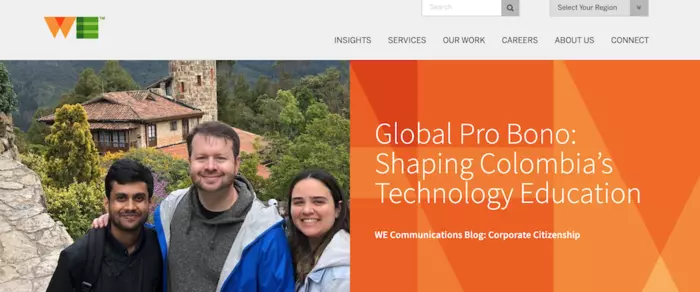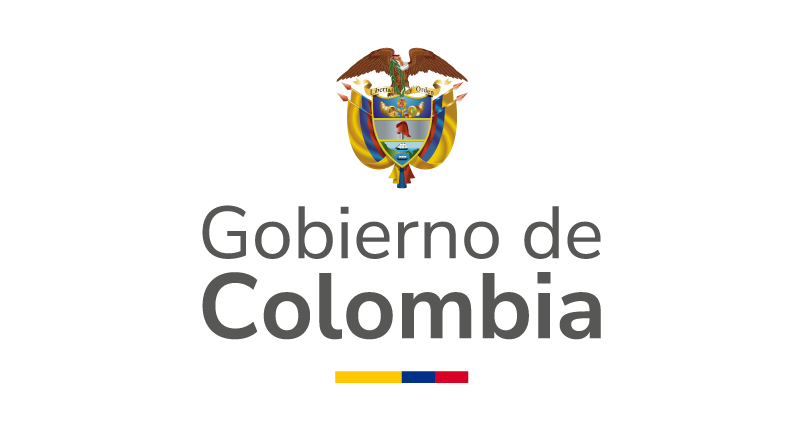Global Pro Bono: Shaping Colombia’s Technology Education
-
Filtrar

- WE Communications Blog: Corporate Citizenship
11/19/2019
— Rhian Rotz, Director - Corporate Citizenship
At WE, doing good with actions has always been more important than words. This is especially true when it comes to education, a cornerstone of our corporate citizenship initiatives. That’s why we launched the Global Pro Bono program in 2017, in partnership with Pyxera Global.
In October, three members of WE went to Bogotá, Colombia, for a month to support Computadores Para Educar (Computers for Education - CPE) and Fundación Batuta, alongside five colleagues from SAP and Niagara Bottling. The education-based organizations bring unique and critical perspectives on building strong communities in a country with a troubled history.
CPE provides laptops and tablets to public schools and helps students acquire the computer skills they need to thrive. It also provides training to the teachers to help them incorporate tech-friendly teaching techniques in their classrooms and curriculum. CPE is looking to broaden its mandate by focusing on providing an ecosystem where students can learn newer and emerging technologies such as robotics, artificial intelligence and more. Fundación Batuta, the Spanish word for “baton,” began 28 years ago amid the turmoil of the Civil War. The organization provides free afterschool music programs to families affected by the armed conflict.
We spoke to Ameera Farooqui, Jon Repp and Shivank Agarwal, the three WE members who traveled to Bogotá, to hear exactly what they got up to.
HOW DID YOUR WORK HELP SOCIETAL ISSUES?
Jon: Our team worked with Computadores para Educar (CPE) for four weeks. CPE’s huge mandate requires a complex organization, especially in a country where many schools don’t have internet connectivity, and some don’t have electricity. CPE is also a government agency, so there’s lots of bureaucracy involved.
Ameera: My work helped support CPE’s broad business strategy and recommended next steps over the next six to 12 months. The hope is that they will implement some of the changes we proposed, and ultimately continue to offer free after-school music programs for children in low-income areas.

WHY IS EDUCATION AN IMPORTANT CAUSE TO SUPPORT IN THE COMMUNITY?
Shivank: Investing in education expands business opportunities, creates new markets and increases customer bases. A more educated workforce leads to better wages and more disposable income for consumer spending. Education also holds the key to solving some of the most fundamental problems that we, as a global society, face today such as gender inequality, societal conflict and climate change.
Jon: Education is the ignition switch for opportunity. As a community, it helps us collectively advance by prioritizing things that are of most value to us and to the next generation.
WHAT WERE THE CHALLENGES YOU FACED DURING YOUR PRO BONO EXPERIENCE, AND HOW DID YOU OVERCOME THEM?
Shivank: When you’re working with people you’ve never worked with or met before, to achieve common goals for an organization based in a country that has a completely different geopolitical and regulatory framework, you will inevitably struggle to adapt and perform at your best. By being open to different viewpoints and incorporating them in your strategy, not only will you help your host clients, but you’ll also develop vital management and leadership skills for yourself.
Jon: For our daily work, we had a local student work with us who was incredibly good at translating complex conversations and facilitating communication. We learned very quickly to shorten our thoughts and to take some time to really think through what we wanted to say. This forcing mechanism helped us really boil down our questions and helped us focus on key deliverables from each meeting.
Working across different cultures was another challenge that we faced and overcame as a team. By acknowledging these differences, this quickly went from a challenge to a strength. As a team, we were able to pool our knowledge and work together on solutions to drive impact for the organization.
WHAT WERE THE TANGIBLE OUTCOMES YOU DROVE FOR THE NONPROFITS?
Ameera: We provided five major deliverables at the end of our four weeks, including a detailed financial, academic and communications plan, a staffing and roles and responsibilities recommendation for the organization. We also helped them understand where some of their organizational tension points and proposed steps they could take to remedy them.
Shivank: My group helped CPE in drafting a strategy to achieve their 2025 vision, i.e., evolving from Computadores Para Educar to Tecnologias Para Educar (Technologies for Education). We did this by identifying six focus areas for CPE and providing tangible action items for each of these focus areas. The six areas were – a) improving the measurement and monitoring metrics; b) improving the communication channels between CPE and the teachers; c) breaking internal silos and developing a “One CPE Mindset”; d) connecting directly with students; e) building partnerships with universities and f) optimizing the delivery and recovery of devices. We presented our findings and shared our recommendations with each team lead and respective team members.

WHAT ARE THE THREE TIPS YOU CAN GIVE TO THOSE LOOKING TO PARTICIPATE IN AN INTERNATIONAL PRO BONO PROGRAM?
Shivank: Take the pre-work seriously. Preparation and pre-work assignments are a great way to familiarize yourself with the people you’ll be working with and the country you’ll be working in. The more you invest in the pre-work, the easier and frictionless your time will be in the host country. We had access to an amazing repository of resources and tools to help us prepare for the programme. You’ll save time and be more productive if you’ve already familiarized yourself with the country and its culture and the organization and its operations.
Ameera: Be authentic. Join a pro bono program because you are genuinely open and interested in learning. Learning about yourself, learning about a new community, learning how to work differently. Be honest with yourself about why you want to be part of this experience.
Jon: Shut up and listen. One of the worst things you can do is jet into a foreign country, meet the organization, and immediately start throwing out solutions. We spent our first week just listening and learning. This was difficult for me because I immediately wanted to jump in and help, but I realized that I was operating on assumptions about the organization instead of a firm base of knowledge. Listening and learning for the first week was an absolute game-changer, and it really helped us approach CPE’s challenges from their perspective instead of our own.
Preparations are already underway for the next four-week program to Vietnam in spring 2020. Three employees will once again work with representatives from other companies to address specific challenges that select STEM nonprofit organizations are facing. Together we will help strengthen organizations whose mission it is to improve educational outcomes and create more sustainable livelihoods and communities. We’re launching the application process at WE this week.
There are still openings for companies who want to join WE, SAP and other companies that value education and social impact. Contact Pyxera Global. Journey on!
Interested in working and learning with us? Find out about careers and culture at WE.
Fecha de publicación 21/11/2019
Última modificación 21/11/2019



